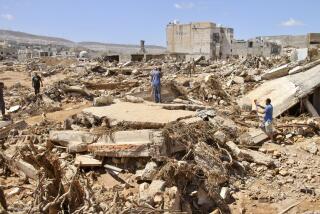In freed Benghazi, Libya’s second city, strong calls for Kadafi’s overthrow
- Share via
Reporting from Benghazi, Libya — On walls across Libya’s second-largest city are the same scrawled graffiti: Game Over.
Days after protesters took control of Benghazi after fierce attacks by Libyan leader Moammar Kadafi’s militia and alleged mercenaries left many dead and injured, demonstrations continued at the courthouse where they began a week ago. People called for Kadafi’s resignation and expressed support for anti-government efforts in the capital, Tripoli, and other cities.
“From the first day, from the 17th, there was no more fear. We fought fear; the revolution’s youth taught us courage,” said Abdulmutalib Bashir, 51. “We are a people who won’t surrender; either victory or death.”
A couple dozen women gathered on the steps of the courthouse in an area designated for them. Together they sang a song written for the revolution, looking not unlike a chorus on stage.
“I am 70 years old and I will die here like the youth of Libya,” said Mariam Mokhtar, wearing the white coat of those who had volunteered to keep the area clean. “I will die here before the courthouse for my country. I’ve been here from the first day.”
Marwan Ahmad, a judge, was well aware of the high stakes facing those who opposed Kadafi, who has run the country for more than 41 years.
“If the revolution doesn’t succeed, we will be hanged. We will be the first ones — the judges, the lawyers — because we are known,” Ahmad said. Kadafi “won’t go easily; he won’t go except by death or interference from another country.”
Ahmad said that his wife delivered their second daughter Feb. 15. He wants to name her “Free Libya,” a name his wife does not approve of.
He pointed to a lawyer picking up trash along the street, “This is the first time the people feel this is their country.”
A new Benghazi City Council was expected to begin work Friday. Inside the courthouse, courtrooms and chambers have been transformed into the offices for city departments. A few rooms, though, are holding prisoners, those accused of being mercenaries paid by Kadafi to kill protesters.
Many of those injured were taken to Jalaa Hospital, now renamed Martyrs Hospital, according to a painted sign hanging above the entrance. During several days of clashes, the hospital saw 120 to 140 dead, Dr. Abdullah Mahdi said.
Fawzi Mansuri, 43, lay in a room with two other patients, his head and chin wrapped in gauze and his chest and left arm bandaged. A soldier and resident of Beida, a city about 120 miles northeast of Benghazi, he had joined other men in fighting militiamen and mercenaries that had descended upon his city.
He was shot three times, including a bullet that smashed his jaw. He was taken to the hospital in Benghazi to have his face repaired. He spoke through lips he could barely move.
“When we saw that Moammar brought people from outside to fight us, that was it,” he said. “We are for the land, we are not for Moammar.”
More to Read
Sign up for Essential California
The most important California stories and recommendations in your inbox every morning.
You may occasionally receive promotional content from the Los Angeles Times.













